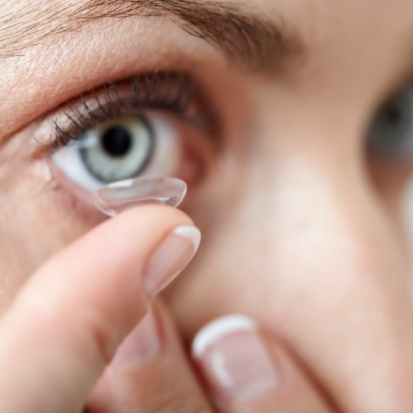Whether this will be your first time wearing contact lenses or not, this guide is intended to assist you for getting the best and most comfortable fit for your lenses.
Knowing whether you have any eye conditions will help your contact lens specialist choose the right lenses for you. You may be going to wear contact lenses for the very first time.
If your eyes do not have any of the below listed eye conditions, you will not need special lenses, but if you do have any of these conditions, please note that there will be a lens that should work just for you.
Some common eye conditions are:
1. Dry Eyes
2. Keratonconus
3. Giant papillary conjunctivitis
4. Post-refractive surgery (such as LASIK)
5. Presbyopia
If you have certain eye conditions, your contact lens specialist may recommend gas permeable lenses. GP lenses are made of non-pliable material and will retain their shape on the eye. The advantage of the GP lense is that it can give a smooth, uniform surface to focus light and sharpen vision for a cornea that has an irregular surface.
Some eyes that are keratonconus are too sensitive for the gas permeable lens. If that is the case, a hybrid contact lense may work better. The hybrid is an advanced lense that includes a GP center with a soft ring around it.
Another advanced lense is the scleral and semi-scleral gas permeable type. This GP has a large diameter that rests on the white sclera of the eye.
If your doctor says you have an astigmatism, it might be likely that he or she will fit you with toric lenses. These lenses can be a little tricky as they must move correctly when you blink and yet stay aligned in a specific way without rotating. For this reason, you doctor may try several toric lenses to get just the right fit for you. There are even custom design toric contact lenses, so don’t be too concerned.
If you have chronically dry eyes all the time, soft contact lenses might be uncomfortable for you. There are specially made contact lenses for dry eyes. These lenses will retain moisture better and you should be able to wear them for longer periods of time than the traditional lenses.
The doctor may recommend that you treat your dry eyes with eye drops ususally called artificial tears. There are also medicated eye drops available and dietary supplements for eye nutrition.
Punctual plugs as part of your eye treatment may be something new to you. If your doctor chooses these for you, you will insert them into the tear drainage ducts near the inner margin or your eyelids to block tears from leaving the surface of your eyes. These are made out of collagen or silicon. They will increase eye comfort when wearing your contact lenses.
Disposable contact lenses are very popular today. Some of the advantages of these are obvious, but they also can keep your eyes healthier. In other words, if you are throwing your lenses away, there is not much time for the lenses to get a build up of protein on them.
If you have had LASIK sugery, gas permeable and hybrid lenses could be fitted for your eyes, especially if you have any high-order aberrrations. If you have excessive glare these lenses should be helpful.
A very popular choice for presbyopia is the monovision contact lenses. They work like bifocal or progressive eyeglass lenses.
Because there are so many choices in contact lenses these days, your doctor will fit you with the lenses that are just right for you. Be patient and willing to work with wearing them for a while until you get used to them. Wearing contact lenses is wonderful if they can work for you. Without eyeglasses on your face, you will feel like a new person!





